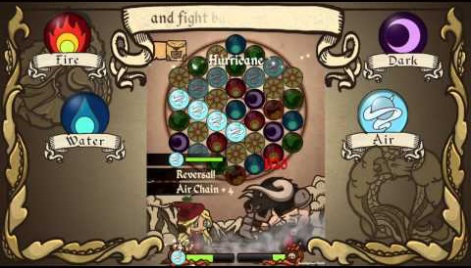Amir Rajan, who ported the text-based emergent RPG A Dark Room to iOS, recently shared revenue figures for the game on Reddit.
Amid the numbers, Rajan makes a couple of interesting (if not necessarily true) statements. These are:
1) It's possible to be successful by releasing lots of small games on mobile
2) In the comments, Rajan says "I think the most important thing is to stay true to whatever your style is, and try to build a personal connection with the player"
We decided to bring these two statements to our Indie Mavens to see what they thought about them. Agree or disagree? The question we asked them was this:
- "Do you think you could stay true to your style and build a connection with players while making lots of small games? Or does that demand more of a labour of love approach for you?"
I don't think "labour of love" and "small games" contradict each other. I often thought during development of SwapQuest that I would like to have a really small side-project for all the ideas I got in that time.
For a game designer it's almost impossible to work on a larger project without having plenty of ideas to distract you.
But back to the question: As everything I come up with comes from a perspective of fun and love, I'd say it's absolutely possible. If that leads to more successful games is another question.
No one piece of advice will fit everyone, and I think it's dangerous to conflate "truth" or "love" with a single-minded focus or single way of working and developing as a creator.
Every independent creator is driven by what interests them.Tanya Short
If I put my cynical hat on, "staying true to your style" can also mean "specializing in a niche and capitalizing on your existing fan base"... which is suddenly less appealing-sounding, right?
Every independent creator is driven by what interests them -- but some are more obsessive while others are more easily distracted. As the latter type, I suspect that sometimes it's more useful for me to force a bit of extra focus like he says (i.e. "stay true to my style").
However, for others it might be more useful to force a bit of extra exploration and comfort-zone expansion (i.e. maybe they're staying a bit too true to their style).
Sustaining multiple releases in a short space of time is an exhausting prospect!
We made and released two Glyph Quest games in 14 months and worked out we would need to be releasing a game every four to five months to earn a living from it without having a run away hit!

I think it's unwise to underestimate just how much of your time is needed to market and support a mobile title before you can move onto the next game.
And the more titles you have out there the more of your time will be spent maintaining those connections. As for this being a labour of love? Well I don't know an indie dev who isn't in this for the love!
That is exactly what I do. Making lots of small games with a consistent style is not an active choice, it's my default behavior. I'm lucky that it works out for me (although I'd be much happier with the numbers in that reddit thread).
When it stops working out for me, I'd rather get a full time job than be independent while making games I didn't love.
The key thing is to remain focused on the scope of your project.Tom Fry
Absolutely! The key thing is to remain focused on the scope of your project (say, a game that takes four weeks to develop) and mould your aesthetic and brand to fit those limited parameters.
One of the big plus points of having a limited development schedule is that it will greatly simplify all elements of the game, the (hopeful) net result being that it will have a more immediate impact on the player from the getgo.
Over time, and provided you have a base of satisfied, happy players, this can enable the developer to positively reinforce and gild this aesthetic over time - i.e., players will associate a developer's snappy brand with quality, fun and engagement above other titles on the market.
One of the numbers he mentions is having "10 games".
My personal preference is for a very high level of polish.Ian Sundstrom
My personal preference is for a very high level of polish and a sustained exploration of whatever game system I am developing.
That means my development time requires quite a long time (seems to be averaging at about a year or more).
So it could take me ten years to reach that magic number of games! Since polish and fully exploring whatever original design idea I'm working on is so important to me, I don't think the "lots of small games" approach would work with my slow-churning design philosophy.
That isn't to say it couldn't work for others (or larger teams)!
We just went through this recently with the new Thanksgiving update to Finger Derpy. There's a lot of new content added to the original horse-racing game, but now with turkeys. Should we have released a new game, calling it "Turkey Derpy"? Should each update be a new 'Derpy' game in a series?
We could certainly create a number of small titles that way. When you have established a core style for the original game, this would be possible to stay true with each new release (following the pattern of the original).
For us, though, we've opted to continue to build the original game, and pull more people into it, with more updates, and more content.
I would say yes you definitely can.
Looking at my games, I always tried to make something small (cap dev-time at about 6 month) while trying to be different in each one of them. While this can work i think it would be even better if your games are recognizable by style. This doesen't has to be art but some kind of connection between your games is preferable.
There are some awesome examples of such interconnected works. For example everything that Aliceffekt does. His whole body of work is very cohesive and instantly recognizable.
It's interesting because after Card Crawl I'm in the same dilemma where i want to create something new but would love to cater to those fans who liked Card Crawl and are now waiting for more of the same.
I would argue if you can strike an interesting balance in your work between creating a universe that is interconnected and creating something new and exciting each time you add to it you are on a very good path.
While the idea of making lots of small games seems attractive, I don't think it's a scalable strategy. In order to grow and be successful, you need to grow your audience and make games that have value for them.
Games that are made small because they are rushed or seen as disposable deliver less value.Dan Menard
Games that are made small because they are rushed or seen as disposable deliver less value. You might still attract people, but you won't form a relationship, which means they don't become repeat customers.
Case in point, the sequel to A Dark Room did worse than the original. The market has evolved a lot since 2013 when the first game was launched, but game sequels typically sell more than their previous iterations (which is why huge franchises like Call of Duty and GTA continue to be successful).
At Double Stallion, we want to form a personal connection with our players and our audience, and that means engaging them. For us, that means more of a "labour of love" approach, but with a very keen eye on who we are making the game for and why they will see it as valuable.
Financial success is usually a fairly good measure of whether your player base appreciates and values your game.
Making a lot of small games is a style in itself, and not necessarily an uninteresting one. I want to explore games in all they have to offer, and that means multiple small projects rather than a large one.
I'm not that interested in being a specialist of this or that genre, I’m not interested in long and complex projects.
I want to explore games in all they have to offer, and that means multiple small projects rather than a large one.Francois Alliot
It may not seem to be a very sensible approach financially speaking because well, "Rome was not built in a day", you can’t expect to make games that are as beautiful, enjoyable, complete as the ones AAA or even Indie teams spend years to make.
And yet I think it makes perfect sense, as it makes perfect sense to be indie in 2015 despite the apocalypse and all that.
It goes beyond "Small is beautiful". There are a lot of things to explore out there, new things that are not big enough yet for larger studios to explore; games in museums; games for the press; games in healthcare; and games themselves. We’re just opening the pandora box of what could be done.
Being able to make a lot of small projects is being able to learn from each one separately and from the whole game making itself, it’s being able to understand what is happening in the scene and where it all goes. Because you can compare your experience from one game to another, you become slightly more « tuned » and precise each time you start something new.
Beyond that, three other things are crucial in defense of smaller projects:
- Your ability to finish things.
If you’re a game developer, I hope it’s because you like to try new things. And "trying new things" is the exact contrary to "finishing things", which is what you will have to do most of the time.
I was terrible at finishing things, I learned it the hard way, after years of prototyping new stuff I will certainly never show anyone. It’s still a pain, but now I know rather precisely my limits, the amount of time I can pour in a project before it becomes unbearable.
Everyone has a limit like that and it’s generally exponential. You need to find it, better to do that by going from small projects to less smaller projects than spend 6 years in a project and fail (or even worse, carry on with a walking dead project).
My limit is around 8-10 months, and only if I can do 2 project at the same time, so I can switch when I'm bored.
- Collaboration!
Meeting different people, working with different set of minds and different skills everytime is very helpful to learn something valuable. Smaller projects let you multiple that.
- Spread the impact of inevitable economic failure
However great your game is, it will quite probably fail (as our dear Rami said very truly in his famous speech). So, make more games.
Focus on a couple of things that work on your prototype, push forward if people come back to your stand when you exhibit the game, but whatever happens, don’t linger… at any point of your projects, you should be able to ship something, from an enjoyable free game-thing to a complete project.
Or like I do, have two projects at the same time. It's not crazy at all (I mean not completely).
I have a lot of ideas for a mobile game that I want to make. I am trying to explore making a game that uses street fighting and hip hop culture... which is going to take the right amount of work.
It has to be a great mobile game, and not just a port.
There's a reason this has been taking a long time.
































